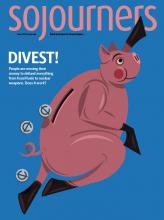THE SEASON AFTER Pentecost is a challenge. Some churches call it “ordinary time.” This is where most of our life is lived, spiritually speaking. The fact that other churches call it “the season after Pentecost” reminds us that a miraculous tongue of fire is needed for any sermon to work—and the Holy Spirit has a tongue of fire for us. Pentecost propels us through ordinary time. The Holy Spirit can take as sorry a lot of losers as the ones Jesus chose as disciples and turn them into apostles, martyrs, world-changers. God has always done more with less-promising material.
A retreat at a monastery gave me a glimpse of what ordinary time means. By the time 8 a.m. Mass rolls around, we’ve already been in church three times that day. Mass is beautiful, we leave buoyantly, the Trappist monks are nearly chatty. Then the bell rings. It’s time for Terce, another hour of prayer. That bell sets me to sighing—weren’t we just in church? Terce is like the Sunday after Easter or Christmas—a letdown. Same building, half full of people, and with a quarter of the energy. And it is precisely then that it’s important to worship God. The church’s worship of God carries on when we’ve all gotten bored or tired. Such worship is good for souls. Preachers’ souls included.
Read the Full Article

